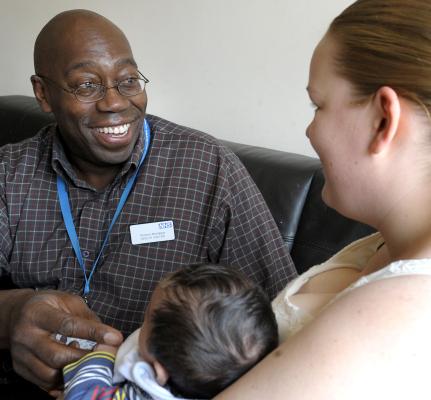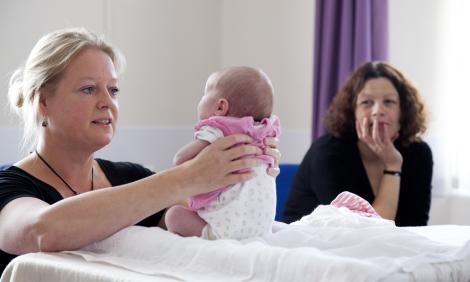Health visitor
Health visitors are specialist community public health nurses, (SCPHN) registered midwives or nurses.
They specialise in working with families with a child aged 0 to five to identify health needs as early as possible and improve health and wellbeing by promoting health, preventing ill health and reducing inequalities.
Working life
Health visitors are NMC-registered nurses or midwives who have undertaken additional training in community public health nursing to become specialist community public health nurses. Health visitors lead the Healthy Child Programme (0-5) and are fundamental in ensuring every child has the best start in life.
Your role will routinely include working with families with a new baby from late in the antenatal period up to five years of age. You will use your expertise and training to identify needs and determine risks and work with clinical and public health colleagues to make sure the right support is provided as early as possible. You may work with at-risk or deprived groups such as the homeless, addicts or travellers.
You will usually provide individual support and advice for families in their homes. But you will also facilitate clinics and groups with different professionals, including early years practitioners, children’s social care professionals, GPs, school nurses, allied health professionals, and voluntary services to support the needs of children and families.
Your day-to-day role may vary from area to area, but will typically include:
- supporting parents during their transition to parenthood and in the weeks following the birth of their baby
- providing support and advice for the initiation and duration of breast feeding, infant feeding and healthy eating for young children
- assessing children’s growth and development needs
- delivering health reviews to assess children’s growth and development needs, including the two-year health review and to be ready for school
- promoting the best start in speech, language and communication including identification of need and additional support to be ready to learn
- supporting maternal and infant mental health
- supporting healthy weight and healthy nutrition conversations to prevent childhood obesity through behaviour change techniques.
- advising on minor illness, home safety, safer sleep and accident prevention
You will also complete holistic assessments in partnership with the family which builds on their strengths and identifies any difficulties they have with meeting their child’s needs.
You’ll often be the first to recognise whether a child is at risk of harm and a very important part of your role will be working with other health and social care partners to:
- safeguard and protect vulnerable children
- identify those at risk
- support local safeguarding arrangements and ensure the voice of the child is considered
Richard Montague
Health visitor
Read Richard's storyI am one of the very few male health visitors in the area so I also offer specialist support to fathers and promote fathers as positive role models in a child's upbringing.

Entry requirements and training
The health visitor training programme is known as the Specialist Community Public Health Nursing - Health Visiting (SCPHN - HV). It is offered at degree or Master's level. You need to be a registered midwife, adult, child, mental health or learning disability nurse to apply.
The full time programme is run over 52 weeks, but you may be able to train part time over a longer period. In some areas training may also be offered as a master's level apprenticeship.
You will need to apply to be sponsored or seconded by a health provider organisation who will provide your clinical placement and a community practice assessor and supervisor. The course is 50% theory with a university and 50% practice with a health provider organisation, under supervision from a range of specialised practitioners working with children and families.
Training opportunities are usually advertised on NHS Jobs. Make sure that your search includes words such as SCPHN /student /Health Visitor/HV.
Pay and conditions
Some health visitors are now employed outside of the NHS, for example in local authorities or private healthcare providers, charities, or community interest companies, where terms and conditions can vary.
If working for the NHS, you'll usually work a standard 37.5 hours per week and be paid under Agenda for Change pay system, typically starting at band 6. You’ll also have access to our generous pension scheme and health service discounts, as well as at least 27 days of annual leave plus bank holidays.
Must-have skills
To be a health visitor, you need:
- an interest in children and public health
- excellent communication skills
- to be well organised
- confidence
- to be able demonstrate leadership skills
You will need to be able to cope with potentially challenging situations such as child safeguarding.
You need to be able to work both independently and as part of a team and will be flexible, observant and able to prioritise effectively.
Where your career can take you
You will have opportunities to progress into operational or management roles, leading teams, specialising in quality and governance, service transformation or commissioning.
You could go into teaching within the community, working as a practice assessor or supporting clinical academic research. Or you could move into an academic position as a lecturer or researcher at a university
Want to come back to health visiting?
If your SCPHN registration has lapsed, you will need to complete a return to practice programme. Email us so that we can put you in touch with someone in your local area who can offer tailored advice.





